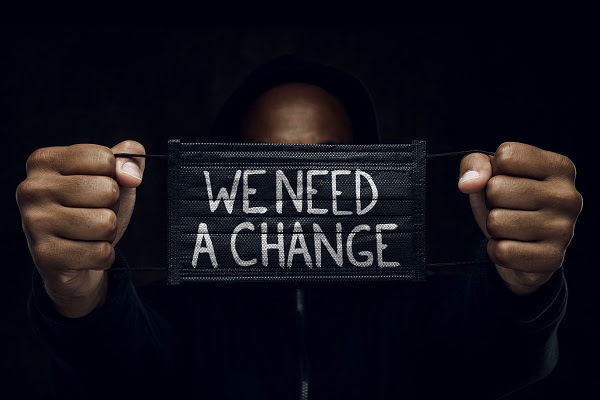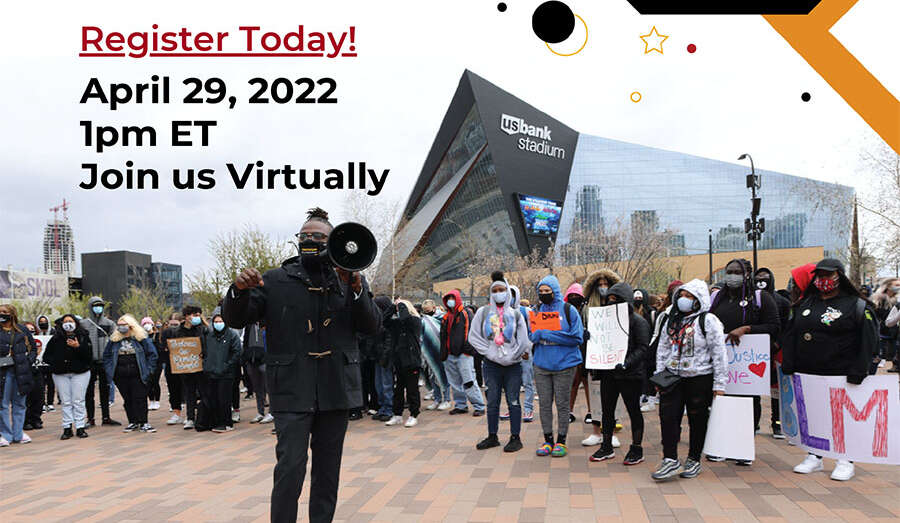Meyiya Coleman, 22, describes familial connections to the issues she organizes around. Growing up on the West Side of Chicago, she says she was about eight years old when she started engaging in community activism with her family. At a young age, she lost a cousin she loved dearly when he was gunned down at a gas station blocks from her grandmother’s house. Later, her grandmother — who Coleman says was her best friend — survived a gunshot to the head. Her grandmother began joining Coleman, who is a youth organizer at Communities United, in speaking to legislators to advocate for gun violence prevention. When her grandmother passed away, Coleman used this work as a means of coping. “Just to know that I’m continuing something that she started is truly amazing to me,” she tells Teen Vogue.
A frequent topic of conversation at Communities United is the idea of people power, Coleman says. Without it, “You will never have no one come together,” she adds. “And I believe that having intergenerational work within your organization is definitely how you organize and really put that people power into effect.”
These narratives are usually oversimplified. While some headlines attempt to reduce so-called “generation wars” to phrases like “okay, boomer” and the downfall of skinny jeans, others proclaim that it’s the young people, and the young people only, who are capable of saving the world. But in the midst of the noise, there are also organizers intentionally working across generations to solve problems impacting their communities. As Teen Vogue columnist Mary Retta wrote in a recent piece for Bitch, capitalism and inherently broken, racist systems benefit most from the concept that only one generation can lead. This mentality can tokenize certain age groups, embolden those who aren’t embedded within a community to speak on their behalf, and gloss over the fact that America’s structural crises are harmful to people of all ages — and have been for centuries.
Priya Dalal-Whelan, 18, had parents who did various kinds of movement organizing, and had never heard the term generation wars, which she had to google. One of the adult organizers she’s worked closely with told her the fight for environmental justice has been ongoing for 500 years, since Columbus first invaded the Americas. “That really opened my eyes, and I think it’s something more youth organizers need to hear,” Dalal-Whelan tells Teen Vogue via email. “This work didn’t start when we first became aware of it, and it’s not going to end with us either.”
Dalal-Whelan, who works with Minnesota Youth for Climate Justice, helped organize a joint strike with a local labor union, SEIU local 26, which organizes janitorial staff in Twin Cities corporate buildings. Many workers, Dalal-Whelan says, identified themselves as climate refugees, driven out of their home countries because of climate change, while many organizers are second-generation immigrants dealing with extreme weather events in the United States, and the groups forged a natural connection. The janitors went on strike demanding a green-cleaning training program in addition to wage increases and improved benefits. Minnesota Youth for Climate Justice joined them on the picket line, and Dalal-Whelan says the group ended up winning all their demands. “It was a real win-win relationship — neither of us could have pulled off that win without the others,” she says.
When it comes to statistics about older generations skewing more politically conservative, Dalal-Whelan points out that systemically oppressed people, including poor people, queer people, and BIPOC are more likely to die young. (A 2020 article published in the University of Chicago’s Journal of Politics indicated that political attitudes remain remarkably stable over the long term, while other data compiled by the Pew Research Center observes that millennials have an increasingly liberal outlook on many issues, a suggestion that they may rebuke conventional wisdom that generations grow more conservative with age.) Dalal-Whelan points out that the “adults failed youth” narrative is a lie: “All generations have people who will try to perpetrate racial capitalism and those who will fight it,” she adds.
How the narratives play out matters: When organizing and activism are adult-only spaces, it undermines the lived experiences of young people who can offer solutions because they’ve been subjected to the problems. When work functions as an extension of youth — shifting the knowledge and historical legacy of movements led by generations of young people to catchy clickbait on “young leaders” — it ignores fights for progress that have spanned generations. One reason these narratives can be so harmful is, for one thing, “putting the burden on children to save the world is deeply f-cked up for obvious reasons,” says Dalal-Whelan.
A “dimension of harm comes from the erasure of race and class that happens when the fight is framed as a fight between generations,” she adds. Using climate change as the example, Dalal-Whelan explains there are a lot of privileged young people, herself included, who have been shielded from the effects of climate change, whereas there are working-class BIPOC who have already died because of its impact. And the media’s efforts to center “youth voices” can lead to young white organizers speaking over young BIPOC organizers, Dalal-Whelan points out. “A part of respecting youth is also recognizing that we have the same capacity to cause harm as adults, and a part of adults’ roles in mentoring and supporting us should be to mitigate that,” she adds.
Mentors can speak to the historical push and pull of movements, and how they can be co-opted. Luis Jonathan Hernandez, 19, recalls experiencing a moment like this during the racial justice protests of summer 2020. Hernandez, 19, director of youth campaigns and leadership at the Gathering for Justice, says he felt dismayed to see cities paint “Black Lives Matter” on the streets but hadn’t put his finger on why. His mentor, Carmen Perez, reminded him of a Malcolm X quote: “The white man will try to satisfy us with symbolic victories rather than economic equity and real justice.” That’s what Hernandez felt, he says, when he saw people celebrating the murals while cries to defund police departments went unheard. “If you’re not connected to your elders, and you’re not connected to people who’ve done this work before, that’s something that you’re going to celebrate without realizing that that’s a symbolic victory and not something that’s actually going to bring us any sort of equity and real justice,” Hernandez tells Teen Vogue.
Hernandez says Gathering for Justice prioritizes intergenerational work, focusing on historical education that’s rooted in culture and nonviolence, as well as mentorship. That’s also something Hernandez has seen in his involvement in the New Deal for Youth Changemakers, which works across generations to drive policy. “We know that young people are knowledgeable and innovative. As the generation that historically bears the brunt of structural injustice, young people are consistently forced to organize on their toes,” says Hernandez. “Working with our elders and those around us really allows us to analyze the work in a different way; we’re able to take advantage of what each generation has to offer.”
It works in reverse too. “As Black immigrants, we do everything intergenerationally,” Santcha Etienne, 40, the Miami chapter organizer for Black Alliance for Just Immigration, tells Teen Vogue. “We recognize that different generations may have access to different information and that we sometimes see the world differently, but we are going to get to where we want to go together.” Part of that is focusing on leadership development so younger folks feel more comfortable in governing positions, and training that helps everyone understand where each person is coming from. “We ask older members to make space and respect the leadership of younger members.”
The power dynamics at play — the idea that progress is co-created rather than siloed into achievements defined by age — feels significant. “I certainly think that patterns of ‘adults lead, youth follow’ can be really hard to break, even in spaces that are dedicated to disrupting the status quo,” Taylor Kahn-Perry, 22, tells Teen Vogue. Kahn-Perry, who works with Student Voice, described partnering with ALL4SC, a University of South Carolina–based accelerator, to lead a community-asset-mapping process with young people in Fairfield County. “We built a relationship with adult partners who immediately wanted to lean on our expertise as young people to engage new students in educational equity work, with full faith in our ability to do so,” says Kahn-Perry. It’s a true partnership, with every step being co-created.
“It can be incredibly challenging to get to a place where youth and adults are authentically sharing power, but I think once that place is reached, there’s already been so much mutual effort to understand interpersonal dynamics and their relationship to social inequities that organizing becomes all the more effective and intentional,” Kahn-Perry adds.
The ageism embedded in the “leading generation” mentality can run both ways: Young people can be disenfranchised by those in positions of power who refuse to see the value of their contributions, solutions, and labor, even though young adults are directly impacted by an intersection of issues. Meanwhile, when older individuals are pushed out of organizing spaces, it focuses the conflict on which generation has it worse, divorcing movements from their historical context and ignoring the reality that older people have long borne the brunt of many of the issues today’s young people are fighting against.
Mostly, it lets systems of power that have disenfranchised people for generations blame each subsequent generation for not doing enough, a convenient scapegoat. “Movements exist, movements have existed for centuries,” Dalal-Whelan adds. “They aren’t perfect, but neither are we, and there is a lot of wisdom and resources out there to learn from and collaborate with.”
Want more from Teen Vogue? Check this out: There’s No Such Thing As a Dream Job — and That’s Okay
Stay up-to-date with the politics team. Sign up for the Teen Vogue Take!


